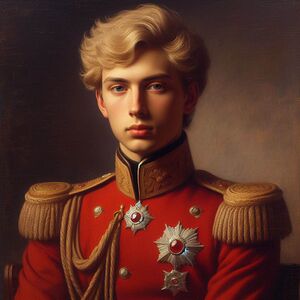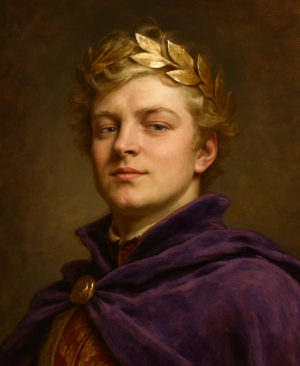Prince Charles Viromaro: Difference between revisions
Coetzeeclan (talk | contribs) mNo edit summary |
Coetzeeclan (talk | contribs) m →Youth |
||
| (18 intermediate revisions by the same user not shown) | |||
| Line 1: | Line 1: | ||
[[File:Crown_Prince_Charles_L._Viromaro.jpg|thumb|Crown Prince Charles Viromaro]] | [[File:Charles Marfeurt.png|thumb|Charles Marfeurt, formally known as Crown Prince Charles Viromaro, Fifth Era]] | ||
Prince Charles Viromaro is a Pretender to the Kythiran Throne living in exile in the Republic of Aqumis. Once the Crown Prince of the Kythiran Empire, he was superseded by his sister Theodosia Viromaro due to the Reforma Carta. | [[File:Crown_Prince_Charles_L._Viromaro.jpg|thumb|Crown Prince Charles Viromaro upon turning 18, Fourth Era]] | ||
[[File:Prince Regent Charles.png|thumb|Prince-Regent Charles Viromaro, Late Fourth Era]] | |||
Prince Charles Viromaro is a Pretender to the Kythiran Throne living in exile in the Republic of Aqumis. Once the Crown Prince of the Kythiran Empire, he was superseded by his older sister Theodosia Viromaro due to the Reforma Carta. Upon learning about this, he went into a self-imposed exile, stealing 59 million Florynts (although 40 million was lost during the Sinking of the Solène). For this, he was formally banished, losing all his noble and military ranks, rights and privileges in the Kythiran Empire, as well as being forced to change his name into Charles Marfeurt. | |||
== Youth == | == Youth == | ||
Prince Charles Viromaro, formerly Crown Prince Charles Viromaro, was the heir-apparent during the late Fourth Era | Prince Charles Viromaro, formerly Crown Prince Charles Viromaro, was the heir-apparent during the late Fourth Era, set to become Emperor Charles IV Viromaro. | ||
He studied History at the Imperial University of Helmira, | He is the second child and firstborn male heir of Emperor Louis Viromaro and Empress Prisca Viromaro. He accompanied his father, Emperor Louis, to most state functions in the role of Crown Prince. When he was five years old he was allowed to knock the hammer to begin the yearly opening ceremony of the Imperial Senate. The Grand Helmira Hotel, build during the Great Expansion of Helmira, was originally named the Prince Charles Hotel in his honour. | ||
He studied History at the Imperial University of Helmira, where he ultimately received a doctorate. After this, he went to the Imperial Naval Academy to become an officer in the Imperial Navy, quickly rising through the ranks until he became a captain, commanding the ''Vuursian''. | |||
Like his father before him, he too lived in the Winterhal Palace. | |||
== Crown Prince, Admiral, Prince-Regent == | == Crown Prince, Admiral, Prince-Regent == | ||
During the Kythiran Invasion of Imperius, he served in the Kythiran Imperial Navy as an Admiral, where he commanded the Second Attican Fleet, and was present during both the Battle of the Northern Sea and the Liberation of Lotric. When he learned of High-Lord Von Roterstein's failure to deliver troops for the war efforts, he challenged him to a duel, but the High-Lord either never received the letter or chose to ignore it. | During the Kythiran Invasion of Imperius, he served in the Kythiran Imperial Navy as an Admiral, where he commanded the Second Attican Fleet, and was present during both the Battle of the Northern Sea and the Liberation of Lotric. When he learned of High-Lord Von Roterstein's failure to deliver troops for the war efforts, he challenged him to a duel, but the High-Lord either never received the letter or chose to ignore it. | ||
After the | After the assassination of his mother, Empress Prisca, he returned to Helmira, taking the role of Prince Regent as his father became increasingly isolated. | ||
During this time he continued to clash with his High-Lords. A Viromaro absolutist like his father, Charles had never left Helmira before the war. He dismissed the Imperial Senate, and tried to influence the war as much as possible. According to sources at the Imperial Palace, he had even drafted up a letter sentencing High-Lord Von Roterstein to death for the latter's refusal to deliver ships and soldiers for the war effort, but the letter was ultimatly burned before it could receive the Imperial Seal. | |||
== Loss of power == | == Loss of power == | ||
After the end of the war, the High-Lords of the Big Three conspired against the crown | After the end of the war, the High-Lords of the Big Three conspired against the crown, forcing Emperor Louis to dismiss his son and sign the Reforma Carta. Furthermore, he had to resign in favor of his daughter, Charles' older sister Theodosia Viromaro. Charles tried to fight against the Reforma Carta, issueing arrest orders for all three High-Lords, but the commander of Helmira's Imperial Guard refused to follow these, and both his father and the Grand Chancellor ultimately signed the Carta in order to prevent a civil war. | ||
Rather than surrendering his power, Charles decided to escape the Empire and go into self-imposed exile in the Republic of Aqumis. Still an Admiral of the Second Attican Fleet, he ordered two ships to sail towards the Viromaro [[Sanssouci Palace|palace of Sanssouci.]] During the war, much of the Viromaro fortune had been hidden across the empire, often using imperial palaces to store it. Sanssouci was one of these palaces, and it was here he loaded 59 million Florynts into two ships. Sailing to Aqumis, the ships both entered a violent storm, and the largest ship broke apart and sunk within seconds, taking with her 40 million Florynts and her entire crew. Charles managed to assist in getting his own ship through the storm safely, and he reached Aqumis with 19 million Florynts. | |||
Once his theft had been discovered Empress Theodosia enacted the Act of Erebus, which stripped Charles Viromaro of all his titles, lands and rights within the Empire. His personal properties, including numerous estates, ships and other valuables were seized. The Prince Charles Hotel was renamed into the Grand Helmira Hotel. Even his last name became illegal to carry, and he was formally renamed Charles Marfeurt. He however has refused to acknowledge any of this. | |||
== Current status == | |||
Charles Marfeurt currently lives in a lavish estate in the Republic of Aqumis, under continuous protection by a small army of mercenaries, mockingly called the ''Second Imperial Legion'' by the Helmira Times. Thanks to his stolen fortune, he is the wealthiest inhabitant of the republic by far, and one of the wealthiest individuals in Minecraftia. Personal Life | |||
Prince Charles during his time as Crown Prince was betrothed to the countess of Alberico. However, they never married, and although she lived with him for some time, this relationship was clad in scandal. In exile, Charles remains unmarried. | |||
Prince Charles during his time as Crown Prince was betrothed to | |||
Latest revision as of 23:03, 10 July 2025



Prince Charles Viromaro is a Pretender to the Kythiran Throne living in exile in the Republic of Aqumis. Once the Crown Prince of the Kythiran Empire, he was superseded by his older sister Theodosia Viromaro due to the Reforma Carta. Upon learning about this, he went into a self-imposed exile, stealing 59 million Florynts (although 40 million was lost during the Sinking of the Solène). For this, he was formally banished, losing all his noble and military ranks, rights and privileges in the Kythiran Empire, as well as being forced to change his name into Charles Marfeurt.
Youth
Prince Charles Viromaro, formerly Crown Prince Charles Viromaro, was the heir-apparent during the late Fourth Era, set to become Emperor Charles IV Viromaro.
He is the second child and firstborn male heir of Emperor Louis Viromaro and Empress Prisca Viromaro. He accompanied his father, Emperor Louis, to most state functions in the role of Crown Prince. When he was five years old he was allowed to knock the hammer to begin the yearly opening ceremony of the Imperial Senate. The Grand Helmira Hotel, build during the Great Expansion of Helmira, was originally named the Prince Charles Hotel in his honour.
He studied History at the Imperial University of Helmira, where he ultimately received a doctorate. After this, he went to the Imperial Naval Academy to become an officer in the Imperial Navy, quickly rising through the ranks until he became a captain, commanding the Vuursian.
Like his father before him, he too lived in the Winterhal Palace.
Crown Prince, Admiral, Prince-Regent
During the Kythiran Invasion of Imperius, he served in the Kythiran Imperial Navy as an Admiral, where he commanded the Second Attican Fleet, and was present during both the Battle of the Northern Sea and the Liberation of Lotric. When he learned of High-Lord Von Roterstein's failure to deliver troops for the war efforts, he challenged him to a duel, but the High-Lord either never received the letter or chose to ignore it.
After the assassination of his mother, Empress Prisca, he returned to Helmira, taking the role of Prince Regent as his father became increasingly isolated.
During this time he continued to clash with his High-Lords. A Viromaro absolutist like his father, Charles had never left Helmira before the war. He dismissed the Imperial Senate, and tried to influence the war as much as possible. According to sources at the Imperial Palace, he had even drafted up a letter sentencing High-Lord Von Roterstein to death for the latter's refusal to deliver ships and soldiers for the war effort, but the letter was ultimatly burned before it could receive the Imperial Seal.
Loss of power
After the end of the war, the High-Lords of the Big Three conspired against the crown, forcing Emperor Louis to dismiss his son and sign the Reforma Carta. Furthermore, he had to resign in favor of his daughter, Charles' older sister Theodosia Viromaro. Charles tried to fight against the Reforma Carta, issueing arrest orders for all three High-Lords, but the commander of Helmira's Imperial Guard refused to follow these, and both his father and the Grand Chancellor ultimately signed the Carta in order to prevent a civil war.
Rather than surrendering his power, Charles decided to escape the Empire and go into self-imposed exile in the Republic of Aqumis. Still an Admiral of the Second Attican Fleet, he ordered two ships to sail towards the Viromaro palace of Sanssouci. During the war, much of the Viromaro fortune had been hidden across the empire, often using imperial palaces to store it. Sanssouci was one of these palaces, and it was here he loaded 59 million Florynts into two ships. Sailing to Aqumis, the ships both entered a violent storm, and the largest ship broke apart and sunk within seconds, taking with her 40 million Florynts and her entire crew. Charles managed to assist in getting his own ship through the storm safely, and he reached Aqumis with 19 million Florynts.
Once his theft had been discovered Empress Theodosia enacted the Act of Erebus, which stripped Charles Viromaro of all his titles, lands and rights within the Empire. His personal properties, including numerous estates, ships and other valuables were seized. The Prince Charles Hotel was renamed into the Grand Helmira Hotel. Even his last name became illegal to carry, and he was formally renamed Charles Marfeurt. He however has refused to acknowledge any of this.
Current status
Charles Marfeurt currently lives in a lavish estate in the Republic of Aqumis, under continuous protection by a small army of mercenaries, mockingly called the Second Imperial Legion by the Helmira Times. Thanks to his stolen fortune, he is the wealthiest inhabitant of the republic by far, and one of the wealthiest individuals in Minecraftia. Personal Life
Prince Charles during his time as Crown Prince was betrothed to the countess of Alberico. However, they never married, and although she lived with him for some time, this relationship was clad in scandal. In exile, Charles remains unmarried.
